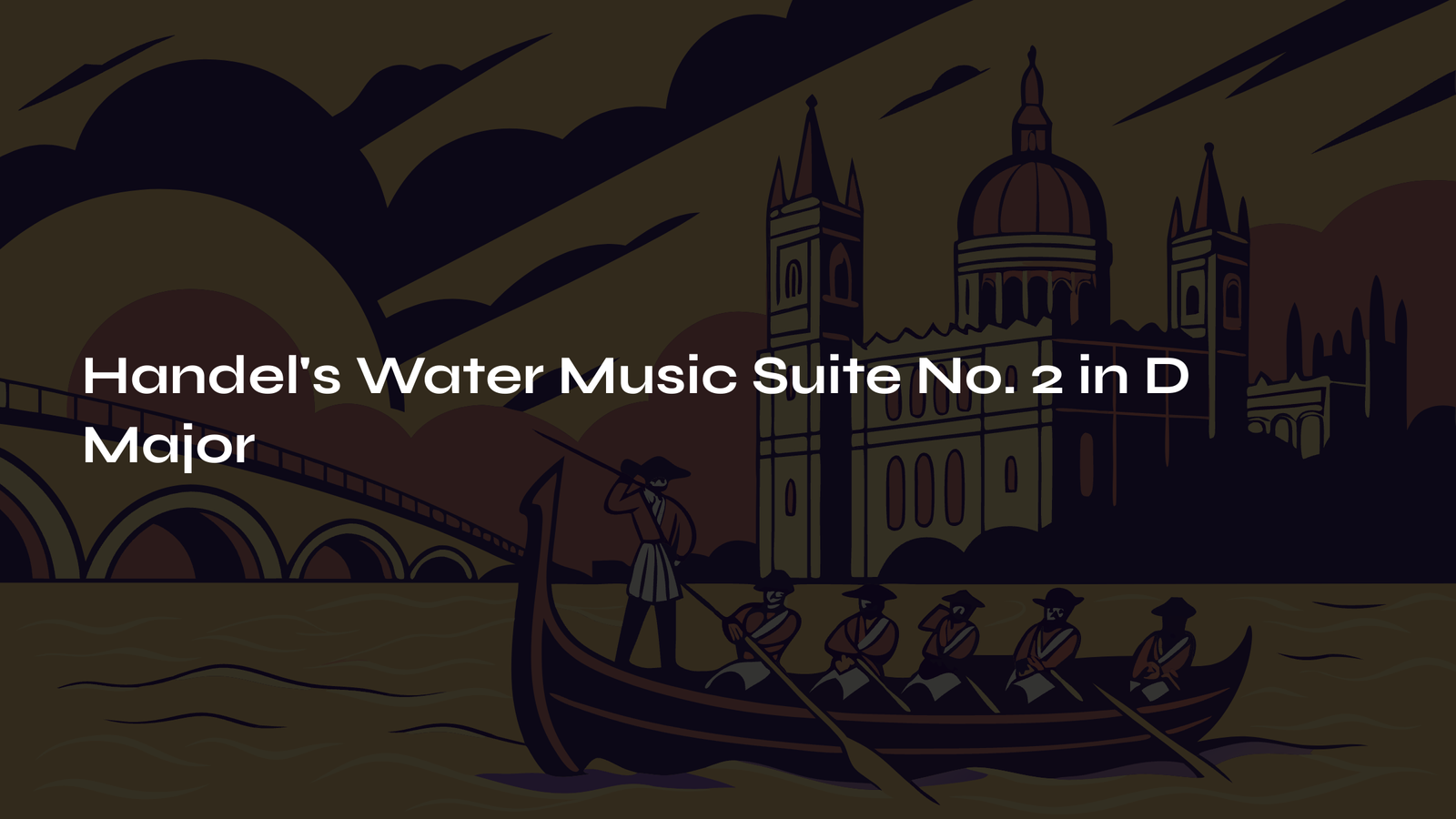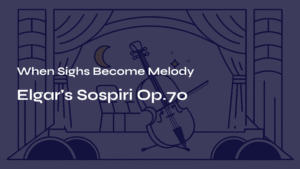Table of Contents
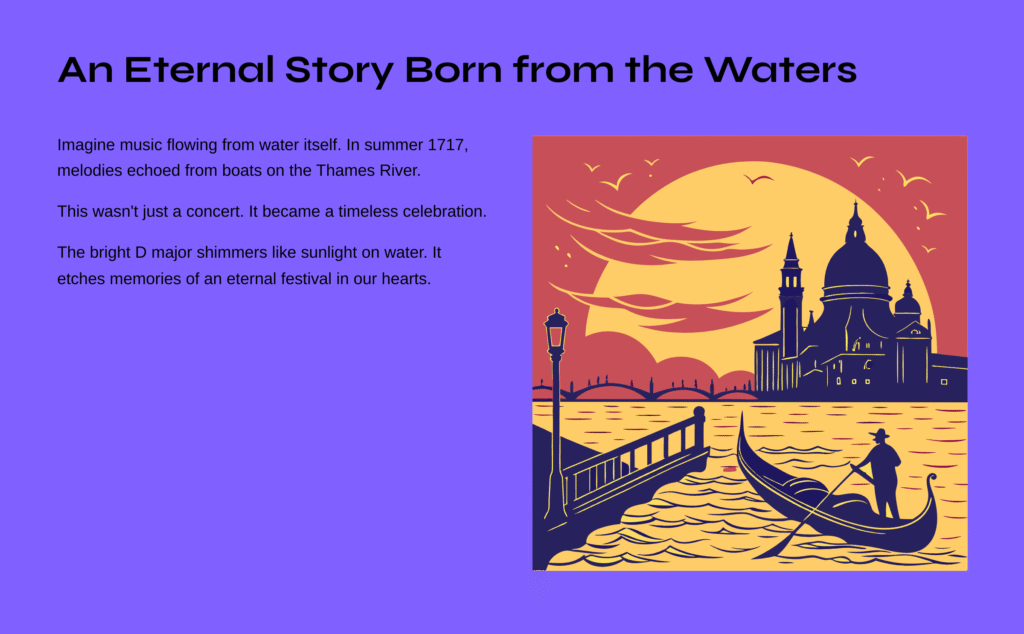
An Eternal Story Born from the Waters
Have you ever imagined music flowing from water itself? In the summer of 1717, melodies echoed from boats drifting along the Thames River. That music transcended a mere concert to become a timeless celebration. Whenever I listen to George Frideric Handel’s Water Music Suite No. 2 in D Major, I can feel the ancient Thames breeze and rippling waves, with musical notes dancing above them like scattered petals.
There’s something magical about this music. It flows as naturally as water yet bursts forth like fireworks in brilliant moments. The bright, radiant colors of D major shimmer like sunlight on the river’s surface, etching memories of an eternal festival deep within our hearts.
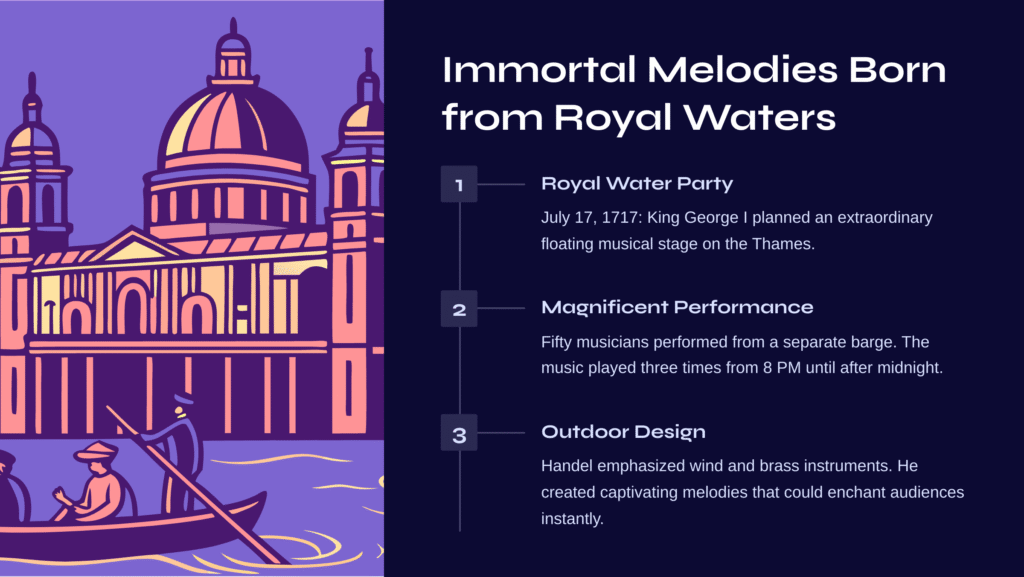
Immortal Melodies Born from Royal Waters
A Special Day on the Thames
On July 17, 1717, King George I of England planned an extraordinary water party. It wasn’t simply a pleasure cruise but a vast musical stage floating on water. Handel, commissioned for this special event, composed three Water Music suites, with the D Major Suite No. 2 being the most brilliant and festive in character.
Approximately fifty musicians performed from a separate barge, accompanying the royal vessel. As the king’s party traveled from Whitehall to Chelsea and back, the music was performed three times over. From 8 PM until after midnight, the Thames became an enchanted realm filled with music.
Specially Designed for Outdoor Performance
Handel crafted this work specifically for performance on water rather than in intimate chambers. The orchestration emphasizes wind and brass instruments over strings, incorporates acoustic considerations for clarity across water, and features immediately captivating, brilliant melodies that could enchant audiences instantly. These elements make the D Major Water Music truly extraordinary.
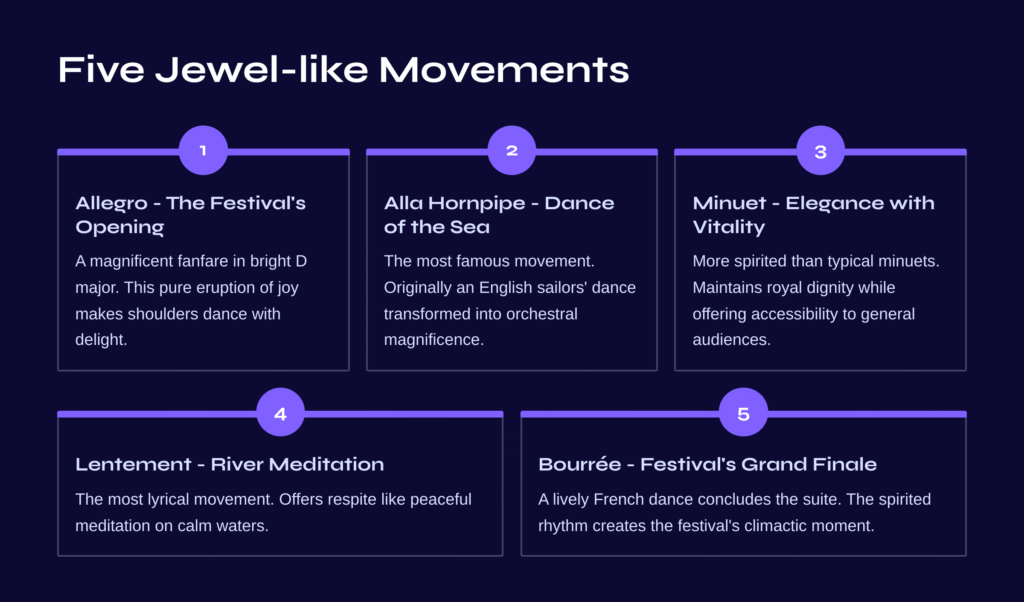
Five Jewel-like Movements
Movement I: Allegro – The Festival’s Opening
The first movement begins like a magnificent fanfare. The bright light of D major explodes instantaneously, as if proclaiming, “Let the celebration begin!” This Allegro differs from traditional Baroque overtures—it’s a pure eruption of joy. Though brief, this powerful movement naturally makes your shoulders dance with delight.
Movement II: Alla Hornpipe – Dance of the Sea
Perhaps the most famous movement in the entire Water Music collection. The hornpipe was originally an English sailors’ dance, which Handel transformed into orchestral magnificence. The melody unfolds over a steady 4/4 rhythm, creating the sensation of dancing upon waves.
Structured in ABA form, this movement’s middle section modulates to B minor, briefly revealing the ocean’s depths before returning to D major with even greater splendor. Whenever I hear this passage, I envision sailors dancing on deck in the sea breeze.
Movement III: Minuet – Elegance with Vitality
This is Handel’s adaptation of the French court minuet for outdoor performance. It’s far more spirited and dynamic than typical minuets, maintaining royal dignity while offering accessibility that general audiences could enjoy together. This exquisite balance exemplifies Handel’s genius.
Movement IV: Lentement – River Meditation
Meaning “slowly,” the Lentement is the most lyrical movement in the Water Music. It offers respite from the previous brilliance and dynamism, providing a moment of contemplation like peaceful meditation on calm waters. This section evokes the tranquility of a boat gliding smoothly across gentle currents.
Movement V: Bourrée – Festival’s Grand Finale
The lively French dance bourrée concludes the entire suite. The spirited 2/4 rhythm combined with brilliant orchestration creates the festival’s climactic moment. When the final chord resonates, we feel bittersweet that this musical journey has reached its end.
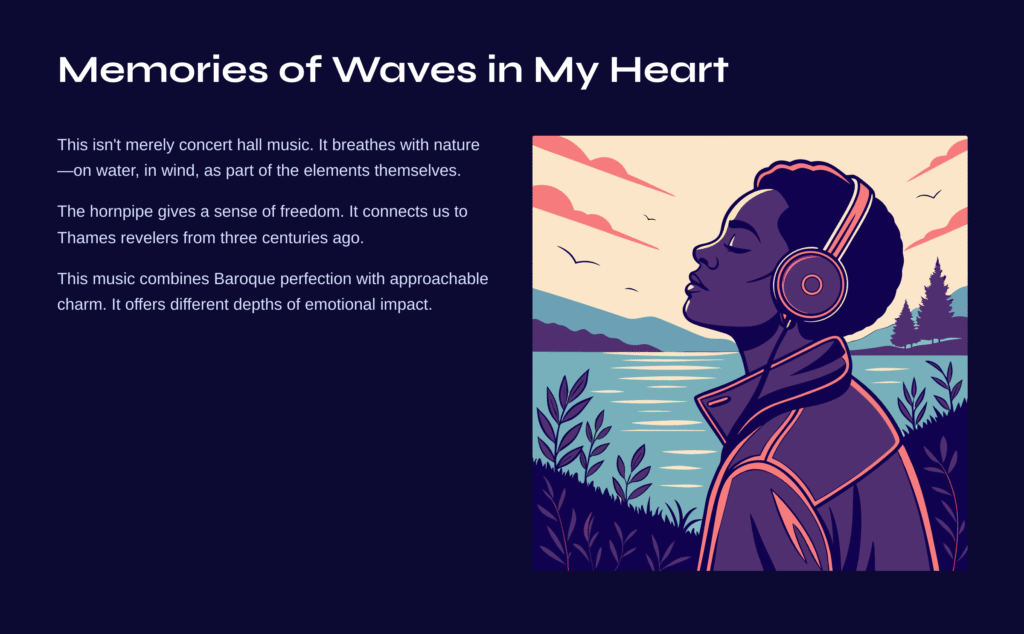
Memories of Waves in My Heart
When I first encountered this work, I was amazed that music could possess such a strong sense of “place.” This isn’t merely concert hall music but music that breathes with nature—on water, in wind, as part of the elements themselves. Handel’s Water Music transcends background accompaniment to become a complete experience in itself.
The hornpipe especially gives me a sense of freedom, like being liberated from daily burdens and floating upon water. Simultaneously, I feel a mystical connection to those Thames revelers from three centuries ago, sharing their same joy across time.
This music contains universal pleasure that transcends eras. It combines Baroque formal perfection with approachable charm that welcomes everyone. Whether you’re a classical newcomer or longtime enthusiast, this work offers different depths of emotional impact—that’s what makes it truly special.

Small Secrets for Deeper Appreciation
I’d like to share several insights for enjoying Handel’s Water Music more richly.
First, pay attention to instrumental roles. Don’t miss the brilliant brass fanfares created by trumpets and horns. Handel specifically highlighted these instruments for outdoor performance. In the hornpipe, notice the engaging dialogue between strings and winds—it’s a fascinating listening point.
Repeated listening reveals new dimensions. On first hearing, focus on overall flow and atmosphere. Second listening, concentrate on each movement’s characteristics. Third time, attend to detailed melodic and harmonic changes. Like the original three-time performance for King George, each repetition unveils fresh delights.
Performance choices matter significantly. Modern and period instrument performances each offer distinct charms. Period instruments recreate historical sounds, while modern instruments provide richer, more brilliant sonorities. Personally, I recommend Trevor Pinnock’s recording with The English Concert.
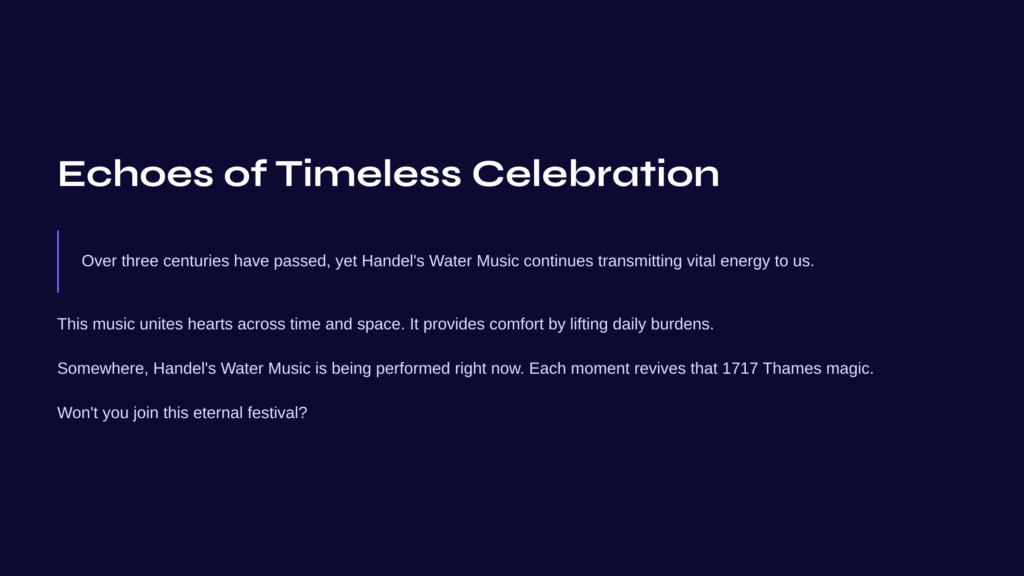
Echoes of Timeless Celebration
Over three centuries have passed, yet Handel’s Water Music continues transmitting vital energy to us. This isn’t merely due to beautiful melodies but because of the pure joy and celebratory spirit embedded within the music.
Listening to this music always reminds me of music’s magical power—the ability to unite hearts across time and space, provide comfort by temporarily lifting daily burdens, and inspire us to rediscover life’s beauty anew.
Today, Handel’s Water Music is being performed somewhere around the world. In concert halls, on radio, through someone’s headphones. Each moment revives that 1717 Thames magic, and music once again becomes a timeless celebration. Won’t you join this eternal festival?
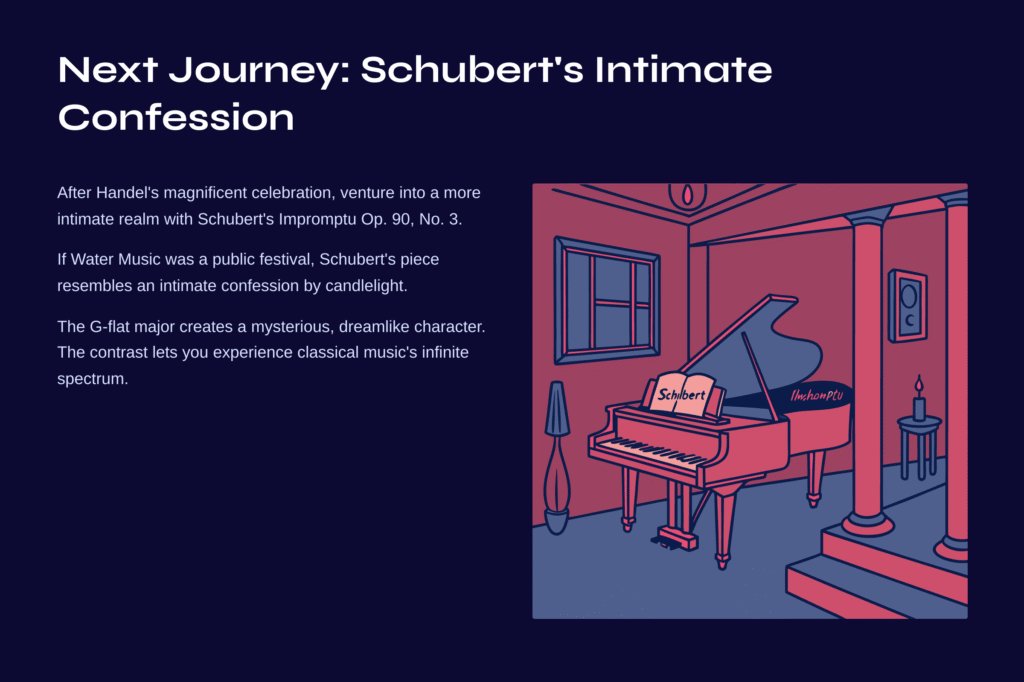
Next Journey: Schubert’s Intimate Confession
After Handel’s magnificent celebration, shall we venture into a more intimate, personal musical realm? I recommend Franz Schubert’s Impromptu Op. 90, No. 3 in G-flat Major.
If Handel’s Water Music was a public festival on water, Schubert’s Impromptu resembles an intimate confession in a small room lit by flickering candles. Within merely six minutes, Schubert allows us to peer into the deepest recesses of human emotion.
This work’s G-flat major is one of piano’s most challenging keys, which gives it an even more mysterious and dreamlike character. The melody created by complex interactions between black and white keys sounds like music heard in dreams.
Hearing Schubert’s quiet piano solo after Handel’s majestic orchestration feels like leaving a grand festival hall to enter a private study. The musical contrast these two composers provide will let you experience classical music’s infinite spectrum.
